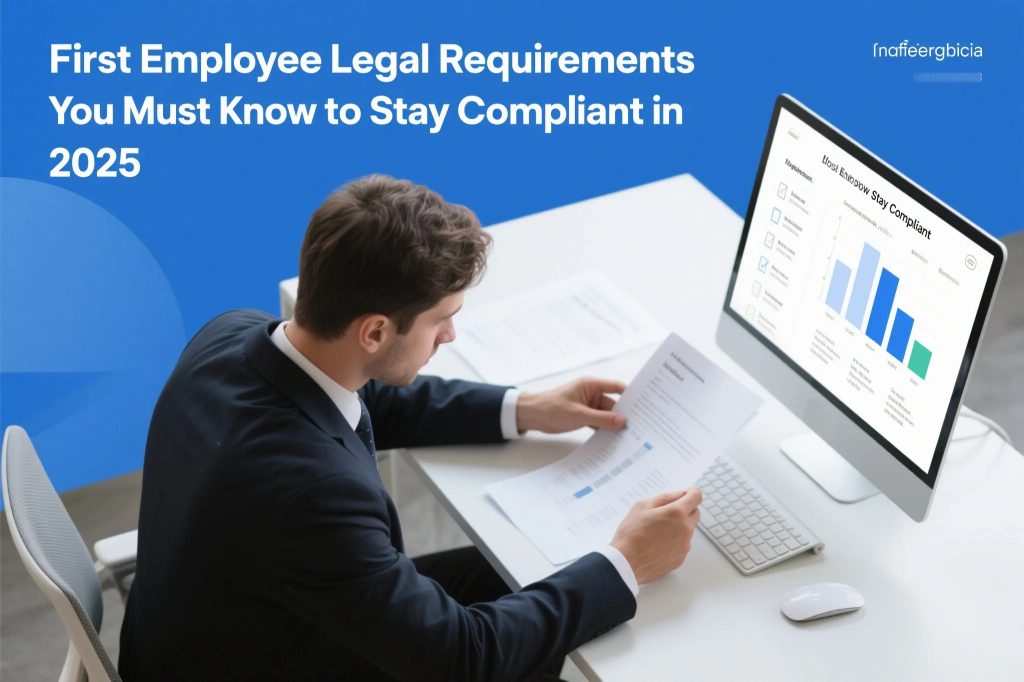The Foundational Legal Steps Before Hiring Your First Employee
Bringing on your first employee marks a significant milestone for any small business, but it also introduces complex first employee legal requirements that demand careful attention. Many entrepreneurs make the costly mistake of assuming their solo operator paperwork will suffice, not realizing that hiring triggers a web of new federal, state, and local compliance obligations. At the most basic level, you’ll need to complete your business EIN setup with the IRS if you haven’t already, as this employer identification number becomes essential for payroll tax reporting and other employment documentation. You must also register with your state’s labor department and obtain workers’ compensation insurance, which is mandatory in nearly all states once you have employees.
Beyond these fundamentals, proper legal advice for new business should address less obvious but equally critical requirements. New hire reporting mandates that you submit employee information to state directories within strict timelines (often 20 days or less). Federal I-9 employment eligibility verification forms must be completed and retained for all hires. Many states now require sexual harassment prevention training for all employees, including small businesses. Perhaps most importantly, you’ll need to establish proper payroll tax withholding systems to avoid painful IRS penalties – this includes federal income tax, Social Security, Medicare, and typically state income tax as well.
Essential Employment Documents and Policies
Protecting your business while maintaining compliance requires a robust startup legal checklist of employment documents tailored to your first hire. At minimum, you’ll need an employment agreement or offer letter that clearly outlines job responsibilities, compensation, benefits, and termination conditions. Many states now require written notice of pay details including rate, pay periods, and overtime eligibility. An employee handbook becomes increasingly important as you grow, but even with your first hire you should document basic policies on work hours, leave, confidentiality, and workplace conduct.
What makes small business employment law particularly challenging for new employers is the variation in state-specific requirements. Some states mandate paid sick leave policies, while others have unique rules about final paychecks or break periods. Several jurisdictions now require salary history bans that prohibit asking about prior compensation during hiring. The most thorough approaches involve creating customized document packages that comply with both federal standards and your state’s particular employment regulations. Many small businesses now use specialized HR platforms that provide state-compliant templates and automatically update as laws change.
Understanding Wage and Hour Compliance
Proper classification under the Fair Labor Standards Act (FLSA) forms the cornerstone of first employee legal requirements regarding compensation. Misclassifying employees as exempt from overtime when they should be hourly represents one of the most common and costly mistakes new employers make. You must determine whether positions qualify as exempt based on specific duties tests and salary thresholds ($35,568 annually under current federal rules, with higher amounts in some states). Equally important is tracking all hours worked for non-exempt employees, including potential overtime, and maintaining these records for at least three years as required by law.
The complexities of small business employment law extend beyond basic classification. Many states have higher minimum wages than the federal $7.25 standard, with some implementing automatic annual increases. Several jurisdictions now require predictive scheduling laws that mandate advance notice of work schedules for hourly employees. Meal and rest break requirements vary significantly by state, with strict penalties for violations. The most compliant small businesses implement timekeeping systems that automatically flag potential issues like missed breaks or approaching overtime thresholds, preventing unintentional violations that could lead to costly wage claims.
Tax Withholding and Reporting Obligations
Completing your business EIN setup is just the first step in establishing proper employment tax procedures. You’ll need to register with your state’s revenue department for income tax withholding, and possibly local tax authorities as well. Federal Form W-4 must be collected from each employee to determine proper income tax withholding, while state equivalents may also be required. Quarterly filings (Form 941 for federal taxes) become mandatory, along with annual W-2 reporting. Many states now mandate electronic filing and payment of payroll taxes even for small employers, eliminating paper options that were once common.
Beyond routine withholding, comprehensive legal advice for new business should address less obvious tax considerations. The federal FUTA tax (unemployment insurance) requires specific calculations and filings separate from income tax withholding. Many states have their own unemployment tax systems with varying rate structures. Some jurisdictions impose additional taxes like disability insurance premiums or paid family leave contributions. The most thorough approaches involve working with payroll providers or accountants who specialize in small business needs, ensuring all tax obligations are met while maximizing available deductions and credits for new employers.

Workplace Safety and Insurance Requirements
Hiring your first employee triggers immediate first employee legal requirements regarding workplace safety, even if you operate from home. OSHA regulations apply to nearly all employers regardless of size, mandating a workplace free from recognized hazards. While businesses with 10 or fewer employees are exempt from routine OSHA inspections, they must still comply with safety standards and report any serious workplace injuries. Workers’ compensation insurance becomes mandatory in most states upon hiring your first employee, with strict penalties for non-compliance that can include stop-work orders and substantial fines.
The nuances of startup legal checklist safety compliance vary significantly by industry. Restaurants face different requirements than retail shops or home-based service businesses. Some states exempt certain categories of employees from workers’ comp coverage, while others have no exceptions. Many insurers now offer pay-as-you-go workers’ compensation plans that help cash-strapped startups manage premium costs. Particularly valuable are safety consultation services offered by some state workers’ comp boards – these free or low-cost reviews can identify potential hazards before they lead to injuries or citations, while sometimes qualifying businesses for insurance discounts.
Employee Benefits and Leave Management
While many benefits remain optional for small employers, certain small business employment law mandates apply from your very first hire. The federal Family and Medical Leave Act (FMLA) doesn’t cover businesses with fewer than 50 employees, but many states have parallel laws with lower thresholds. Several jurisdictions now require paid sick leave that accrues based on hours worked, with some mandating immediate availability upon hiring. Even when not legally required, clear documentation of benefit policies prevents misunderstandings that could lead to disputes or claims of unfair treatment.
Strategic legal advice for new business should address how to structure benefits competitively while maintaining compliance. Health insurance becomes a consideration if you have 50+ full-time equivalent employees under the ACA, but smaller businesses can still qualify for tax credits by offering coverage. Retirement plans like SIMPLE IRAs allow small employers to provide valuable benefits with minimal administrative burden. Many startups now utilize Professional Employer Organizations (PEOs) to access large-group benefit rates and outsourcing HR compliance tasks. The most successful approaches balance legal requirements with recruitment needs, creating packages that attract talent while remaining sustainable as the business grows.
Ongoing Compliance and Recordkeeping
Meeting first employee legal requirements isn’t a one-time event but an ongoing responsibility that demands systematic attention. Federal law mandates keeping personnel files for at least one year after termination, while some states require three years or more. Payroll records must typically be retained for three years, and documents related to FMLA or other leave requests often have separate retention rules. I-9 forms require special handling – they must be kept for three years after hire date or one year after termination, whichever is later, and stored separately from personnel files.
A comprehensive startup legal checklist for employment compliance should include regular review points to ensure continued adherence as laws change. Many small businesses schedule quarterly HR audits to verify proper documentation of new hire paperwork, performance reviews, and policy acknowledgments. Some implement cloud-based systems that automatically flag expiring certifications or upcoming compliance deadlines. Particularly valuable are subscription legal services that provide continuous updates on changing employment laws in your state – these can alert you to new training requirements, minimum wage increases, or other developments that might affect your small but growing team.
Avoiding Common Hiring Mistakes for First-Time Employers
Many well-intentioned startups stumble by overlooking subtle aspects of small business employment law when making their first hire. Asking prohibited interview questions about protected characteristics like age, religion, or family status represents a frequent misstep. Failing to properly classify workers as employees rather than independent contractors triggers increasing scrutiny from regulators. Neglecting to document performance issues or disciplinary actions leaves businesses vulnerable to wrongful termination claims. Perhaps most damaging is the “set it and forget it” approach to employment policies – assuming your initial compliance efforts will suffice indefinitely without updates as laws evolve.
The most strategic approaches to legal advice for new business employment recognize that your first hire establishes patterns for future growth. Implementing scalable systems from the beginning – whether for time tracking, performance management, or policy communication – prevents painful overhauls later. Many startups now engage HR consultants for initial setup guidance, then transition to software solutions that maintain compliance as they scale. Particularly valuable are services that combine document templates with ongoing legal updates, ensuring your employment practices adapt alongside both regulatory changes and your evolving business needs.





